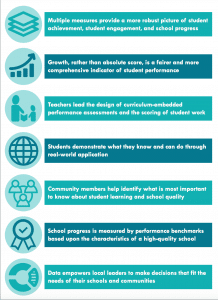What’s New in K-12 Competency Education?
CompetencyWorks Blog
 Lindsay Unified School District transitioned to a performance-based learning system and is seeing results—with a 92% graduation rate (compared to 73% prior to transitioning); 42% of graduates currently attend a four-year university (compared to 21% before); and over 70% of graduates of those students will have a degree within 6 years. With Lindsay High School being recognized for its accomplishments by the White House in Washington, D.C., ranking in the 99th percentile of schools in California that are drug-free, bully-free, alcohol-free, and learner-focused, one would have a hard time finding someone who didn’t view Lindsay Unified School District as not only one of the top school districts in Tulare County, or in the state, but, arguably, in the nation.
Lindsay Unified School District transitioned to a performance-based learning system and is seeing results—with a 92% graduation rate (compared to 73% prior to transitioning); 42% of graduates currently attend a four-year university (compared to 21% before); and over 70% of graduates of those students will have a degree within 6 years. With Lindsay High School being recognized for its accomplishments by the White House in Washington, D.C., ranking in the 99th percentile of schools in California that are drug-free, bully-free, alcohol-free, and learner-focused, one would have a hard time finding someone who didn’t view Lindsay Unified School District as not only one of the top school districts in Tulare County, or in the state, but, arguably, in the nation.
Lindsay Unified School District released a new book: Beyond Reform: Systemic Shifts Toward Personalized Learning.
MCIEA Accountability Principles
The Massachusetts Consortium for Innovative Education Assessment (MCIEA) is creating a new school accountability model in Massachusetts that champions students, teachers and families. They adopted the following seven principles for creating a fair and effective accountability system:
Open Requests for Proposals
- The Barr Foundation is accepting proposals for their multi-year initiative to improve secondary outcomes for New England youth who are off track to graduate. Planning phase proposals are due February 15. Learn more here.
- KnowledgeWorks and Teach the Future launched the Imagine FutureEd Student Design Competition, open to 13-18 year old students. The competition challenges students to think creatively and critically about the future of education. The competition is open from February 20-March 27. Learn more and sign up here.
Implementation Questions
These articles give examples of the types of questions that need resolved when implementing competency education:
- In Lewiston, the new proficiency-based standards are not transparent.
- In York, communities and schools need to develop clarity around grading, transcripts, GPAs, and other details.
Can schools run A-F grading and proficiency-based learning as parallel ways to communicate progress? York High School in Maine thinks so. See article. If your district or school is doing this, we’d be interested in hearing about your experiences.
Betsy DeVos
- Dr. Gisèle Huff describes the school reform that Betsy DeVos and Donald Trump should embrace: the elimination of the rigid, standardized, one-size-fits-all curriculum and its replacement with competency-based learning.
- This article describes the growth versus proficiency debate and its research underpinnings. Here is another article illuminating what it means to navigate the growth versus proficiency divide in practice.
Videos
- What does it mean to meet all students’ needs? The Barr Foundation published a video showing the real-life experiences of students reaching success.
- In this video, six Vermont high school students demonstrate what multiple pathways toward graduation look like, including community-based learning, dual enrollment, early college and more.
School Models
- Colorado’s District 51 hosted a performance-based learning (PBL) forum to teach the community about performance-based learning, and it featured a panel discussion with students, teachers and principals who have been using PBL first-hand. This article highlights their progress, achievements and frustrations in transitioning to a new learning system.
- KnowledgeWorks released a new school profile: Personalizing Learning for Students and Teachers, describing how Marysville School District (OH) implemented competency education to empower students and teachers to learn and grow.
For Teachers
- In this article, Christina Gill calls for teachers to develop a growth mindset, and provides 6 tips for instilling a growth mindset in yourself.
- Here is a Pinterest board on mastery-based learning and grading by Deb Essel.
- Hip Hop Contest, a challenge to students to write a rap song about a historical figure who inspires you, yielded remarkable results—and it worked because it sat at the intersection where popular culture and academic content meet—a pedagogical sweet spot where authentic engagement can be a springboard into skills and standards.
Defining and Differentiating Key Terms
- Michael Horn wrote an EdSurge article on finding ed-tech buzzwords, such as personalized learning, on the Gartner Hype Cycle.
- This article describes the distinction between personalized learning and products—and underscores the importance that personalized learning is a set of strategies that teachers can implement, not a product you can buy.
- Confused about the difference between individualization, differentiation and personalization? Check out this resource by Bray and McClaskey.
Thought Leadership Pieces
- How do we ensure personalized learning is a true equity initiative? Read this article by Ace Parsi and Maria Moser.
- Tom Vander Ark highlights 10 Roles of Effective Leaders as part of the “It’s a Project Based World” series.
New Resources
- Personalized, competency-based education starts with school designs that use the competency-based structure, build student agency through coaching on the habit of work and opportunities for voice and choice, and maximize strong relationships with students. When the structure and pedagogy is clear, schools can take advantage of online learning to provide more flexibility, greater opportunity for practice and feedback, and make it easier for students to move on when ready. The Christensen Institute launched its latest resource: Blended Learning Universe Personalized Learning Forum—as a gathering place for practitioners to ask questions, get answers, and learn from blended and personalized learning leaders around the world.
- According to a recent survey by the U.S. Department of Education, one-third of high schools offer competency-based flexibility to struggling students.
- Achieve released a student scenarios infographic, which tells the stories of three students whose academic progress has been shaped by the opportunities, flexibilities and transparency of competency-based learning environments.
For more news and updates in K-12 competency education, sign up for our monthly newsletter on our homepage and follow us on Twitter: @CompetencyWorks.
